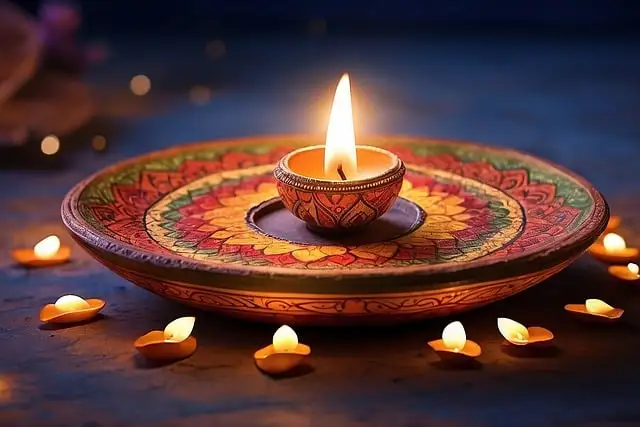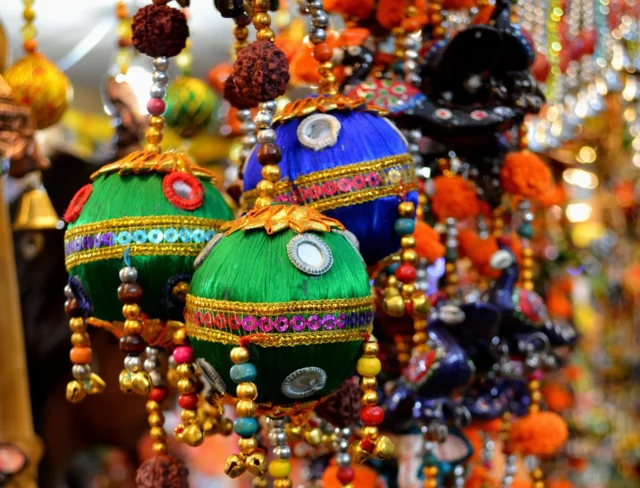
Fascinating Stories of Diwali: The Festival of Lights
Share this article
Diwali, popularly known as the Indian “Festival of Lights,”— is a holiday celebrating the conquest of good over evil and new beginnings. Diwali resembles the spiritual victory of light over the devil and wisdom over ignorance. The origin of Diwali came from the Sanskrit word “Deepavali,” which means “to illuminate in a row.”
Diwali is celebrated worldwide throughout India during the Hindu Lunisolar month Kartika (between mid-October and mid-November). This year, Diwali, the festival of lights, will fall on 12th November. Diwali is a 5-day celebration comprising activities such as illuminating homes with diyas and rangoli (oil lamps or candles), offering pooja (worship), exchanging greeting cards with family and friends, spending time with family and loved ones, and enjoying family feasts.
Historically, Diwali was celebrated in ancient India as a harvest festival. It was a festival at the end of a cropping season in autumn. Though various legends point to the origins of Diwali. Many mythological fascinating stories of Diwali are presented all over India.

Decorative Diya
The most believed story behind Diwali is about Rama and Sita. Diwali commemorates the return of Rama, a major deity of Hinduism, from his 14-year-long exile and vanquishing the Ravana (mythical multi-headed demon of Lanka). In joyous celebration of the return of Rama and Sita to their home, the people of Ayodhya, the capital of Rama, celebrated the occasion by illuminating their homes and streets with earthen diyas, dancing, and bursting firecrackers all over. After this event, the day is considered one of the Hindu faith’s biggest and most important festivals.
Another believed fascinating story of Diwali is the marriage celebration of Goddess Lakshmi, the Hindu goddess of prosperity and wealth. Others celebrate Diwali as the birthday of Lakshmi, born on the new moon day of Kartika.
In some states of India, Diwali is celebrated by worshipping Kali, a goddess known for strength and female power. Ganesha, the god of auspiciousness and wisdom, is also worshipped in some other states of India during Diwali. In Jainism, Diwali has glorified the marking of the great event of Mahavira attaining the eternal bliss called nirvana.
One of the fascinating Diwali stories is when Lord Krishna defeated the demon Naraksura and brought freedom and prosperity to the people of his kingdom. Since that day, people have celebrated Diwali as the light over shade. It is believed mainly by the people of Northern India.
Following prayers for this festival, people celebrate the event with family and friends, exchanging sweets and fruits. Diwali is a festival that comes along with a sense of togetherness. It is an ideal time to heal personal emotions and strengthen family relationships and social bondage.
Diwali gifts are exchanged among families and loved ones during this festive occasion. The silver candle is the most popular among these gifts, which is believed to bring the souls of the departed to the Goddess Smita. When lighted during the festival, it is supposed to spread a ray of light that touches God’s heart and helps it reunite with its heavenly consort. On Diwali, there is always a massive collection of gifts to choose from, such as sweets, chocolates, handbags, wallets, watches, jewelry, apparel, decorative items, diyas, pooja thalis, etc.

Diwali: Festival of Lights
Some people make use of such gifts to decorate their homes. For example, friends gather together and decorate their houses with beautiful candles of various designs and colors. The gifts are then lit, and a melodic prayer is recited by each one. They hope this beautiful gift will help them regain their lost love and prayers for a long time.
Exchanging gifts during Diwali is popular among people of all ages to express love and gratitude to their loved ones. The season is also marked by massive Diwali parties where the devotees travel from their homes to the different shrines of God to participate in the festival. With millions of goodies to offer, these parties make an occasion to remember for all the years to come. In fact, the popularity of the Diwali festival has spread to new regions as well, with the growing influence of the Mughals and the elite British cultures.
Happy Diwali to eveyone!
